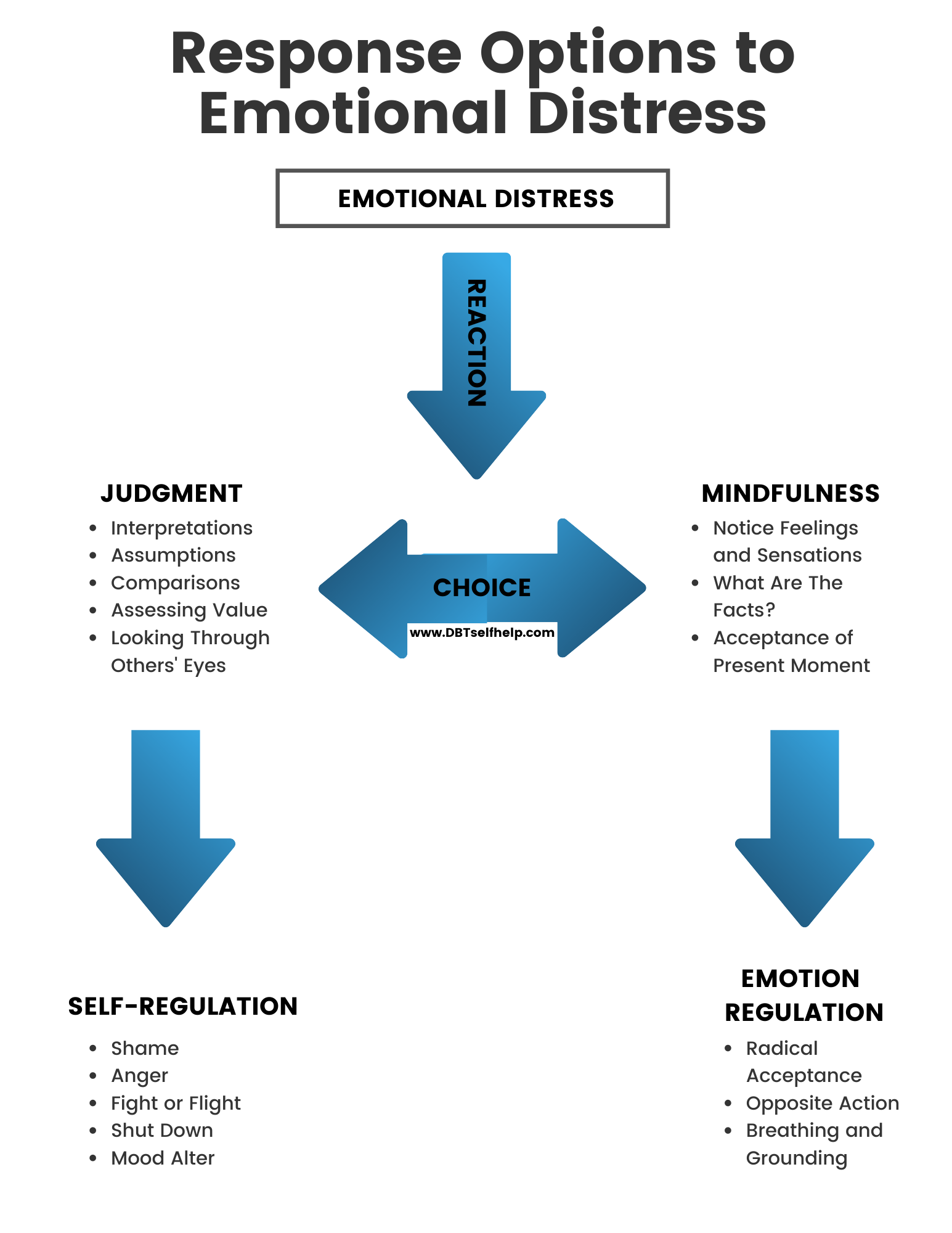Emotion Regulation is the Dialectical Behavioral Therapy module that teaches how emotions work. It...
Emotion Regulation is the Dialectical Behavioral Therapy module that teaches how emotions work. It provides skills to help manage emotions instead of being managed by them, reduce vulnerability to negative emotions, and build positive emotional experiences.

More so than in the other three modules, the skills in Emotion Regulation build on each other. As you learn each little piece and practice it, you are putting another building block into the structure of your own Emotion Regulation, learning little by little how to handle negative emotions and how to build positive ones.
As you learn each new skill or awareness in your life, congratulate yourself. You are doing potentially the hardest work you will ever do, and the outcome of all the struggle and practice will be worth it.
What is Emotion Regulation?
For those who struggle with emotion dysregulation, emotions can frequently be very intense and labile, which means they change often. Emotions drive behavior. Emotionally dysregulated individuals’ behavior often focuses around finding ways to get emotions validated or to get rid of the pain. This can lead to increasingly destructive actions.
Because of this, learning to regulate emotions is a central part of DBT. This does not mean that the emotions are invalid or unimportant, and you are not trying to get rid of them entirely. They are valid, important, and also natural. But because emotions cause so much pain and often make you feel out of control, they must be managed. Part of the management is recognizing these emotions, validating them, and accepting them as real and meaningful.
Emotions come and go, like waves. They are self-perpetuating. Once an emotions starts, it keeps restarting itself. That’s why it’s crucial to step in to stop the cycle.
Primary and Secondary Emotions
There are primary and secondary emotions. The secondary emotion is the one that follows the primary or first emotion, for example, feeling shame because you got angry. Anger is the primary emotion, and shame is the secondary emotion. It’s really important to be able to tell which emotions are the primary emotions and which are the secondary emotions. In order to manage the emotion, you have to get to the root of the problem, meaning the primary emotion.
Sometimes the secondary emotion can be the same as the first. A person can get angry for being angry, or depressed for being depressed. In these two cases, anger and depression are both the primary and the secondary emotions.
Look for shame in particular as a secondary emotion. It is common to feel shame in response to the primary emotion or the behaviors you used in response to the primary emotion. For example, you may feel shame about lashing out in anger.
Emotion Myths
There are a lot of myths about emotions floating around out there. It’s important to challenge those myths before they interfere with your emotion regulation.
For example, a common emotion myth is that “emotions are really stupid.”
This isn’t true. It may feel that way sometimes, but emotions are there for a reason.
Consider other myths like “emotions make you weak,” “I’m not supposed to feel this way,” or “only good feelings are okay.” How could you challenge these myths?
Increasing Positive Emotions
Increasing Positive EmotionsIncreasing positive emotions is crucial to building a life worth...
Opposite to Emotion Action
Emotion Regulation is the Dialectical Behavioral Therapy module that teaches how emotions work. It...
Pleasant Activities
Emotion Regulation is the Dialectical Behavioral Therapy module that teaches how emotions work. It...
Problem Solving
Emotion Regulation is the Dialectical Behavioral Therapy module that teaches how emotions work. It...
Identifying & Describing Emotions
Emotion Regulation is the Dialectical Behavioral Therapy module that teaches how emotions work. It...
Letting Go of Painful Emotions
Emotion Regulation is the Dialectical Behavioral Therapy module that teaches how emotions work. It...
Managing Extreme Emotions
Emotion Regulation is the Dialectical Behavioral Therapy module that teaches how emotions work. It...
Nightmare Protocol
Emotion Regulation is the Dialectical Behavioral Therapy module that teaches how emotions work. It...
Opposite Action vs Problem Solving Flow Chart
Emotion Regulation is the Dialectical Behavioral Therapy module that teaches how emotions work. It...
Reduce Vulnerability with ABC PLEASE
ABC PLEASE is an emotion regulation skill. Emotion Regulation is the Dialectical Behavioral...
Ride the Wave
Distress Tolerance skills are a set of Dialectical Behavioral Therapy skills that are strategies...
Sleep Hygiene Protocol
Emotion Regulation is the Dialectical Behavioral Therapy module that teaches how emotions work. It...
Troubleshooting ER Skills
Emotion Regulation is the Dialectical Behavioral Therapy module that teaches how emotions work. It...
What Good Are Emotions?
What good are emotions? Why do we have emotions? There might’ve been a time in your life where you...
Additional Resources
Mental Health Resources
We aren't the only mental health resource out there. Check out these books, websites, social media accounts, and more for additional support. Read More
DBT Flashcards
Making DBT skills second nature takes practice. Use these flashcards on their page, download your own to print out, or purchase our pre-made set from our shop. Read More
DBT Encyclopedia
DBT has its own lingo which can be hard to understand for beginners. Visit our homemade DBT Encyclopedia to figure out what a term means. Read More
Mindfulness Exercises
Mindfulness practice is key to DBT. You don't have to meditate in silence everyday, though. Try these Mindfulness exercises to guide you. Read More
Diary Cards
Diary cards help track your emotions, urges, behaviors, and skill use. They help you see patterns. Learn how to use them and get samples. Read More
